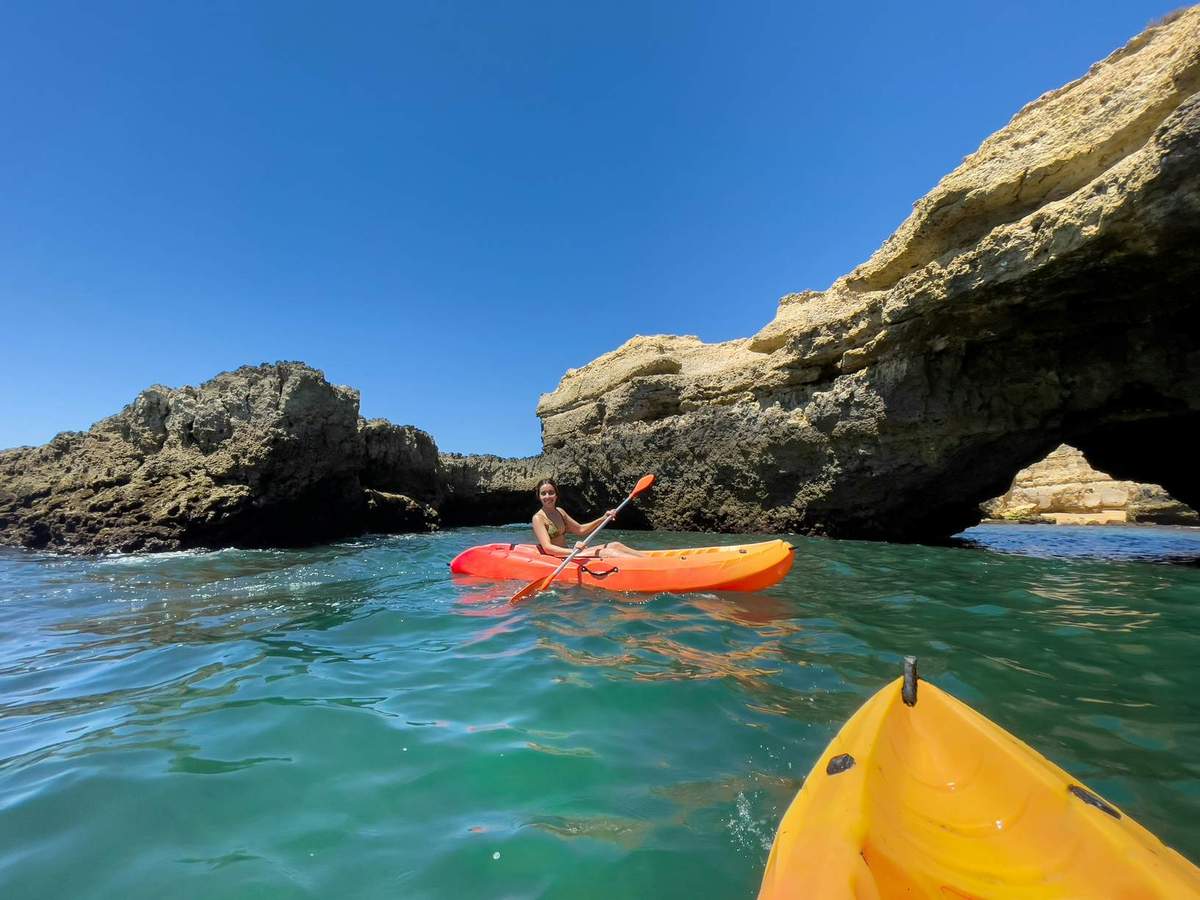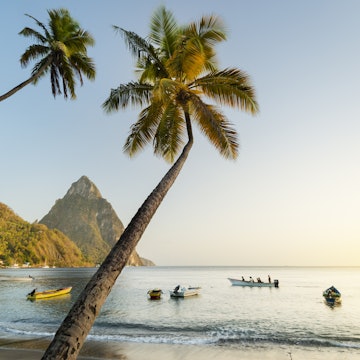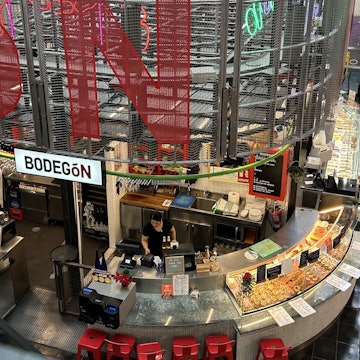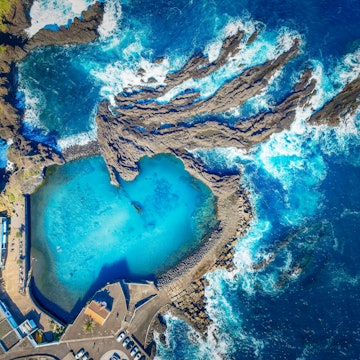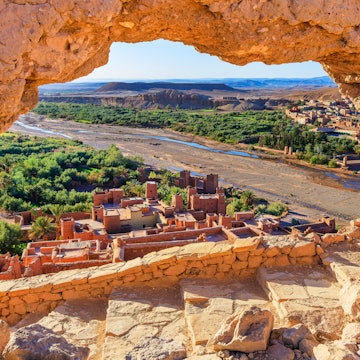

Golden sunlight on the terraced vineyards of the Douro Valley. Shaun Egan/Getty Images
The Douro River bisects the top half of Portugal, carving a ragged gap from east to west. That glass of port you tasted in Porto, or truly all over Portugal, got its start in the almost impossibly steep vineyards that frame the river. And while most visitors to Porto experience the Douro Valley via a cruise, I wanted to do it by train.
The quaint Linha do Douro line in northern Portugal weaves through the river valley lined with terraces for what many consider one of the most beautiful train rides in Europe. There isn’t much at the tiny terminus of Pocinho, just shy of the border with Spain, but in this case, the 200km (125-mile) journey connecting this rural village with Porto is its own destination.
Because the line ends at Pocinho, you have to return the way you came. If done right, however, it’s possible to approach the Linha do Douro as an unhurried, yet occasionally dramatic, day trip – one that even offers a break for lunch and wine tasting.

It's an early start from Porto's São Bento Station
To ensure that you have time for lunch and wine tasting, it’s necessary to take the first train of the day, which departs from Porto’s legendary São Bento Train Station at 6:30am. I was obliged to change trains in the town of Ermesinde, just northeast of Porto, to board my Linha do Douro train, or you can catch the first direct Linha do Douro departure from São Bento at 9:20am. The train cars – made in Switzerland, painted a 1970s-era orange and virtually empty – could easily feature in a Wes Anderson film.
For the next hour, you’ll traverse Porto’s urban sprawl – predominantly gray, semi-industrial suburbs. The first tunnel (of 23 total) is in Caíde, which is also where the views start to become more rural. The town of Ribadouro offers the first glimpse of the Douro, and from this point on, the vistas get more interesting.
The train snakes along the river, with incredibly steep terraced vineyards and tiny villages clinging to hillsides rising on either side. I did the trip in late January, when mist and fog created an otherworldly, remote atmosphere. Whistle-stop stations are decorated with charming tiles; at some points the train tracks are virtually at river level. Be sure to sit on the right-hand side for an unobstructed view. You may be tempted to hop off in the largish city of Peso da Régua, but a wiser stop is Pinhão, where you’ll arrive just before 10am (nearer 11:45am, if you go direct from São Bento).

Disembark in Pinhão for lunch and wine tasting
The last stop for one-day boat trips from Porto, Pinhão is a funny little town, a mix of crusty old winemakers and wide-eyed tourists. It has enough diversions to entertain you for a few hours. Take the obligatory photo of the tile murals at the station, and after a walk along the charming waterfront, start planning lunch. A handful of cafes and restaurants are in the center of town, with spectacular riverfront eateries, such as Veladoura or Cozinha da Clara, located a short walk away.
Alternatively, Pinhão is also home to a legendary butcher, Talho Qualifer – Quinta das Barrocas, where you can taste smoked meats in-house or assemble a riverside picnic lunch. Of course, you’re in the heart of Portugal’s most prestigious wine country, so pencil in time for a tasting session. Several houses, including Croft, Quinta do Bomfim and Quinta do Noval, are right in town and do tastings of standard and fortified wines.
Satiated, and perhaps slightly buzzed, after several hours in Pinhão, continue to the end of the line: Pocinho. Take the 3:44pm train, which arrives in Pocinho in time for you to catch the last return train back to Porto.

The final stretch from Pinhão to Pocinho is the most scenic
The final hour that connects Pinhão and Pocinho is arguably the most beautiful section of the line – and the section that the day-trippers on boats from Porto miss out on. Outside of Pinhão, the Douro narrows, and the scenery becomes more rocky, rugged and wild. At Ferradosa, the train crosses a bridge (one of 35 along the route) to the south bank of the river. Shift to the left side of the train to see tiny train stations – shelters, really – that link to trailheads, abandoned wineries and vineyards that extend right to the tracks.
As you approach the end of the line, the landscape abruptly widens into a broad valley studded with olive trees, a dam and a power plant looming in the distance. In Pocinho, the original wooden station is still intact, though there’s not much else to see or do here.
Take the 5:12pm train back to Porto
Stretch your legs, take a bathroom break and board the train (most likely the same one you arrived on) returning to Porto, which departs at 5:12pm. If there are no delays, you should arrive in Porto at 8:30pm, just in time for dinner.

FAQs about the Linha do Douro
When is the best time to go?
I did the trip in January, which meant the weather was particularly wet and misty. If you’re serious about clear views or photography – or simply want to take advantage of the longer daylight hours – make the trip during the summer months.
Where can you get food and drink on the journey?
Pinhão is your best bet for food and drink. Alternatively, if you’re on a budget, pack a lunch and a bottle of wine ahead of time and plan a riverside picnic.
Where do you buy tickets?
I bought my tickets in advance, yet given how few people ride the Linha do Douro nowadays, you’d probably be fine buying your tickets on the day of travel at the station.
How much does it cost?
A round-trip ticket costs around €30; breaking the trip into bits and buying three separate tickets as I suggest here will cost a tiny bit more.






